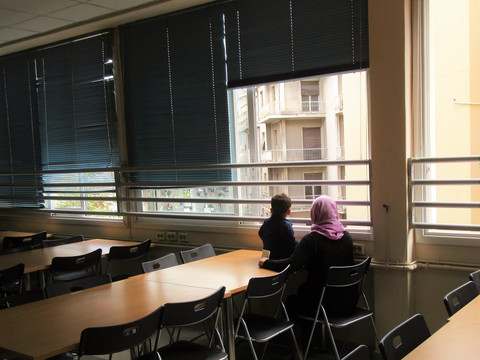[ad_1]

Greece says it should not have to integrate recognised refugees, suggesting they should be instead be free to travel to other EU member states.
The comments were made on Thursday (27 May) by Greek migration minister Notis Mitarachi.
“First reception countries should not themselves participate in having to integrate refugees as already we provide for border protection, reception capacity, and asylum processing,” he said.
Mitarachi made the comments in a hearing at the European Parliament, noting that Greece is hosting some 54,000 asylum seekers.
“The Union cannot expect the frontline member states to single handedly assume the task of integrating a disproportionate number of beneficiaries,” he added.
Greece is demanding an EU-level option to allow beneficiaries to settle in any country they choose.
The idea is likely to be met with resistance as EU states battle out migration and asylum proposals by the European Commission.
Some of those proposals are politically charged, including plans on sharing and distributing asylum seekers.
Among them is a so-called solidarity mechanism, which aims to resolve a five-year old Council deadlock.
The mechanism would require EU states to either relocate asylum seekers, return them, or provide some sort of operational support.
But the Brussels-based NGO European Council on Refugees and Exiles (Ecre) poured cold water on the commission’s efforts, at the same European Parliament hearing.
“The commission’s proposal attempts to resolve irreconcilable political positions,” noted Ecre’s secretary general, Catherine Woollard. This leads to legislation which is highly complex and probably unworkable,” she told MEPs.
Greece’s Mitarachi echoed Woollard’s comments.
“The procedure proposed is bureaucratic. It lacks automaticity,” he said.
Germany, also present at the hearing, weighed in.
While they agreed with Greece on the need to relocate migrants, they also had differences. Greece wants to keep focus on preventing people from arriving, known as “primary movement”.
This includes allowing the EU’s border agency Frontex to operate outside European territorial waters and in deals cut with countries of transit.
But Berlin wants to prevent irregular migrants from leaving their new host country, known as “secondary movements”.
“It is not possible to consider solidarity in isolation from the phenomenon of secondary movement,” said Stephan Mayer, the parliamentary state secretary in the German ministry of the interior.
“Morally bankrupt”
The insights into Greece and Germany likely mirror bigger divisions and splits among other EU states.
The commission had also proposed setting up a system to better coordinate search and rescues.
But some EU states have outright rejected the idea.
Another commission idea, to expand the scope of family reunification, to include siblings has also met with stiff resistance from the EU capitals.
An exasperated Dutch liberal Sophie in ‘t Veld said member states are to blame for persistent problems over migration reforms.
“Maybe we should just lock them in a room with water and bread until they have reached an agreement,” she said.
“In the meantime people say Europe has failed. No Europe has not failed. National governments have failed. They have made this continent morally bankrupt,” she added.
[ad_2]
Source link